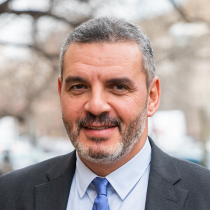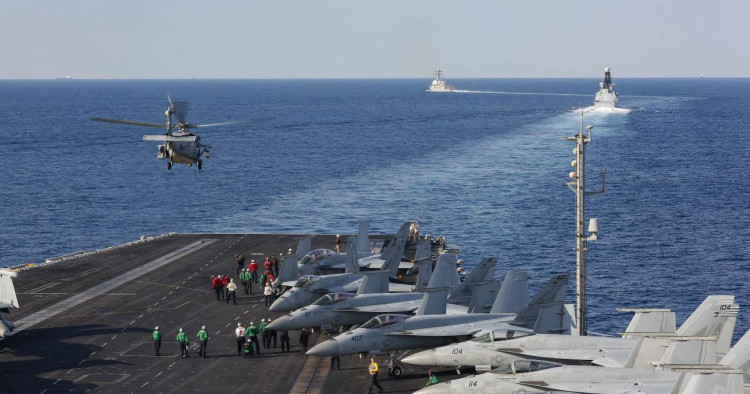Contents:
- US policy navigates tug-of-war between widening conflict and a cease-fire in the Middle East
- Sinwar’s ascension as Hamas chief will complicate cease-fire talks, Palestinian reconciliation
- Rumors and speculation abound as Iran waits to respond to Israel
- For the Gulf states, an Israel-Iran conflict is the worst-case scenario
- Israeli Supreme Court hears case on human rights violations at Sde Teiman
- Three years after its takeover of Afghanistan, the Taliban regime has been nearly normalized
US policy navigates tug-of-war between widening conflict and a cease-fire in the Middle East
Brian Katulis
Senior Fellow for US Foreign Policy

-
The United States sends military reinforcements to deter Iran and its regional partners, while also calling for another round of Gaza cease-fire talks later this week.
-
Events in the region are still driven by actors in the region — namely Israel, Iran, Hamas, and Hezbollah — but external powers like the United States can shape the trajectory.
The Biden administration continues to press for a cease-fire in the Israel-Gaza war as its top priority, even as it prepares for the risk of a wider regional conflict involving Iran, Hezbollah in Lebanon, and the Houthis in Yemen, among other actors.
US Secretary of Defense Lloyd Austin ordered additional military deployments to the Middle East this past week, just days after the United States issued a joint statement with Egypt and Qatar calling for a resumption of Gaza cease-fire and hostage release talks on Aug. 15.
Austin spoke with his Israeli counterpart, Yoav Gallant, on Sunday, and the Pentagon announced that the defense secretary had ordered the USS Abraham Lincoln aircraft carrier strike group to speed up its move to the Middle East as well as sent the guided-missile submarine USS Georgia to the region. These moves are part of an elaborate signaling effort to deter and contain a possible response from Iran, Hezbollah, and Hamas for strikes Israel conducted over the past few weeks.
Even with the international focus increasingly preoccupied with the threat of a widening regional war, Israel has continued its military campaign in Gaza. On Saturday, Israel conducted an airstrike on a school sheltering Palestinian civilians in Gaza City, saying that the building was being used as a command post by Hamas and Palestinian Islamic Jihad. It also ordered more evacuations of civilians in other parts of the Gaza Strip as the Israeli military carries on with its campaign of targeting leaders and fighters in Hamas and other militant groups. Yet Israel’s authorities apparently still have no plan for who will manage Gaza’s security after this war is over.
Amid the ongoing conflict, the Biden administration is still pursuing a cease-fire and hostage release deal as the “North Star” of its current approach. Last Thursday (Aug. 8), the United States issued a joint statement with Egypt and Qatar, the two main regional mediators of months-long efforts to use diplomacy to end the Israel-Hamas war. The tripartite statement called for a last round of talks on Thursday, Aug. 15, to reach a final agreement “based on the principles as outlined by President Biden on May 31, 2024, and endorsed by [United Nations] Security Council Resolution 2735.” White House officials also offered some details on the US’s quiet diplomacy with regional partners in pursuit of the above-mentioned objectives. As of Monday, however, Hamas has pushed back against the resumption of cease-fire talks, contending that they “provide cover for the occupation’s aggression.”
Whether the Biden administration will see successful outcomes in this delicate balancing act — using diplomacy to reach a cease-fire while also sending messages through word and deed aimed at preventing a wider regional war and helping Israel defend itself — depends largely upon the decisions and actions of key actors in the region, namely Israel, Iran, Hamas, and Hezbollah. The Biden administration is seeing the limits of its diplomatic approach being tested by events, as outlined in this recent assessment of US policy.
The overall situation looks grim, as the parties to the various conflicts all seem inclined to use force to advance their interests. Moreover, all of this comes at a time when wider regional and global threats loom, including Iran’s nuclear program. But the window for diplomacy remains open for now.
The coming days will likely be pivotal and may determine if the clashes of the previous weeks erupt into a bigger conflict or give way to a diplomatic settlement. Either way, two chronic conditions that have plagued the wider region — the negative role Iran and its regional partners play and the lack of a just settlement to the Israeli-Palestinian conflict — will likely persist for some time to come.
Follow: @Katulis
Sinwar’s ascension as Hamas chief will complicate cease-fire talks, Palestinian reconciliation
Khaled Elgindy
Senior Fellow, Director of Program on Palestine and Palestinian-Israeli Affairs

-
The appointment of Yahya Sinwar was clearly intended as a message of defiance — namely that not only has Hamas not been defeated but it is prepared to fight on.
-
Sinwar’s elevation to the number-one spot in Hamas will likely harden its posture in the short term, particularly in relation to the cease-fire negotiations with Israel and the internal Palestinian file.
Last Tuesday, Hamas announced that Yahya Sinwar, the group’s de facto leader in Gaza, had been named as the new head of its political bureau following the July 31 assassination of Ismail Haniyeh in Tehran. The appointment of Sinwar, a militant and hard-liner who is believed to be behind the Oct. 7 attack on Israel, was clearly intended as a message of defiance — namely that not only has Hamas not been defeated but it is prepared to fight on. To drive the point home, the announcement was accompanied by a barrage of rockets launched at southern Israel. The decision to elevate Sinwar is widely seen as an interim measure until internal elections, scheduled for next year, take place.
While Sinwar’s long-term prospects remain unclear, his elevation to the number-one spot in Hamas will likely harden its posture in the short term, particularly in relation to the cease-fire negotiations with Israel and the internal Palestinian file. Talks over a cease-fire and hostage release deal have been suspended since Haniyeh’s assassination, in part out of anticipation of an Iranian retaliation against Israel; they will now be much harder to achieve. Despite recent concessions by Hamas, the group is likely to take a tougher line in the truce talks with Israel — both because of Sinwar’s militancy and because Hamas as a whole will be far more distrustful of Israeli intentions following Haniyeh’s assassination. Although Israel has said its negotiators were prepared to resume cease-fire talks, Hamas has officially rejected a tripartite invitation by the United States, Egypt, and Qatar to do so next week.
Sinwar’s ascension will also complicate long-stalled efforts at Palestinian reconciliation, as called for most recently in Beijing. Unlike Haniyeh, who had long supported internal reconciliation, Sinwar is more skeptical of making concessions to Mahmoud Abbas and Fatah and opposes the return of the Palestinian Authority to Gaza. Both of these outcomes — simultaneously thwarting the cease-fire negotiations and Palestinian reconciliation — are in line with the priorities of Israeli Prime Minister Benjamin Netanyahu, who is widely seen, including within the Israeli military establishment, as the primary obstacle to ending the war.
Follow: @elgindy_
Rumors and speculation abound as Iran waits to respond to Israel
Alex Vatanka
Director of Iran Program and Senior Fellow, Black Sea Program

-
As the region waits for Iran to respond to the killing of Hamas political leader Ismail Haniyeh and Hezbollah commander Fuad Shukr, all sorts of arguments are flying about Tehran’s delay in retaliating.
-
Supreme Leader Ayatollah Ali Khamenei has personally vowed retaliation, so there will be some kind of response; as of today, it looks like it will be different from Iran’s retaliatory strike on April 13, but how different remains to be seen.
It has been 12 days since Hamas’s political leader Ismail Haniyeh was killed in Tehran. Iran blamed Israel and has vowed revenge. At this point, Iranian officials are swearing that the retaliation is imminent, and Israeli authorities take Tehran at its word. In this waiting game, all sorts of arguments are flying about why Tehran has delayed its response, some of which are more credible than others. Working out Tehran’s posturing versus its intentions is key in the ongoing international diplomatic efforts to de-escalate the situation.
Take the notion that the newly elected President Masoud Pezeshkian has asked Supreme Leader Ayatollah Ali Khamenei for Iran not to retaliate in a significant way, as a regional war would drag the United States in on Israel’s side and turn all of Iran’s strategic economic assets (like oil installations) into targets. Safeguarding Iran’s already badly damaged economy against the perils of war is a job that falls to Pezeshkian. But he does not have the clout to stop Khamenei; the supreme leader has his own reservations about a regional war, and so, put simply, Pezeshkian’s position on the issue is immaterial.
Another idea is that Khamenei is holding back against striking at Israel because Russia President Vladimir Putin has asked him to. Khamenei is close to Putin, but whether Russia can force him to stand down, especially on such an important issue, is a different matter. Khamenei personally vowed retaliation on April 1, and there will be some kind of response. Can Moscow help minimize Tehran’s revenge? Perhaps. But plenty of analysts in Iran point to Russia as one of the few countries that might actually benefit from a regional war in the Middle East, as it would distract the world from Russia’s war in Ukraine.
Where there is wholesale agreement in Tehran is on the need to avoid any Israeli trap. The assassination of Haniyeh and that of Hezbollah commander Fuad Shukr a day earlier, in Beirut, are seen in Tehran as an effort by Prime Minister Benjamin Netanyahu to provoke an Iranian and Hezbollah over-reaction. Meanwhile, this delay on the part of Iran — which is meant to result in a calibrated response that avoids a regional war but that will also make Israel think twice before hitting Iranian interests directly — is judged as valuable in itself.
In the time since Haniyeh’s assassination, Tehran has been able to secure the support of the 57-member Organization of Islamic Cooperation (OIC) in condemning Israel, which included Saudi Arabia. Iranian officials also think the limbo is much more costly for Israel than it is for Iran. In fact, in a case of wishful thinking, some Iranian hardliners have been quick to push the argument that reverse Jewish migration from Israel has already begun. Iran, however, cannot wait forever if it intends to retaliate. As of today, it looks like Iran’s response will be different from its retaliatory strike on April 13, but how different remains to be seen.
Follow: @AlexVatanka
For the Gulf states, an Israel-Iran conflict is the worst-case scenario
Gerald M. Feierstein
Director, Arabian Peninsula Affairs Program, and Distinguished Sr. Fellow on U.S. Diplomacy

-
Since Oct. 7, the Gulf states have done their best to avoid being drawn into the deteriorating regional security situation, staying quiet publicly while pressing privately for an end to Israeli military operations.
-
Much like they did in April, the Gulf states are once again seeking to prevent a further regional escalation after the assassination of Hamas political leader Ismail Haniyeh, tamping down the risk of an all-out conflict between Israel and Iran.
Saudi Arabia’s condemnation of the Israeli assassination of Hamas political leader Ismail Haniyeh was less a reflection of any concern over violations of Iranian sovereignty than it was a clear indication of their fear that the attack has brought the region one step closer to all-out conflict. Since Oct. 7, the Gulf states have done their best to avoid being drawn into the deteriorating regional security situation. While their populations share the broader Arab and Islamic anger over the indiscriminate death and destruction in the Gaza Strip, governments in Abu Dhabi, Manama, and Riyadh have mostly stayed quiet publicly while pressing privately for an end to Israeli military operations. At the same time, the United Arab Emirates in particular has demonstrated a willingness to be part of the “day after” effort to stabilize conditions in Gaza and begin reconstruction, security, and governance for the strip.
Maintaining a low-profile public posture in the ongoing conflict is in keeping with the overall approach that the Gulf countries have adopted toward the regional security situation for a number of years now. While attention has been focused primarily on initiatives to normalize Gulf relations with Israel, especially the possibility of a Saudi-Israeli deal, the Gulf Cooperation Council states have been equally committed to reducing tensions with Tehran. At the height of US-Iranian confrontation during the Trump administration, first the UAE and then Saudi Arabia pulled back from the brink with the Iranians and reopened diplomatic dialogues with Tehran, making clear that they saw enhancing regional stability as the key to success in addressing domestic social and economic priorities. The Saudi-Iranian dialogue reached its climax in 2023 with the successful talks in Beijing to reopen embassies and regularize relations. Subsequently, Tehran, Riyadh, and Abu Dhabi were invited to join BRICS (the informal cooperative organization of Brazil, Russia, India, China, and South Africa).
Thus, the Arab Gulf states see their regional roles to be primarily to maintain balance and stability and tamp down the risk of an all-out conflict between Israel and Iran that would likely draw in the US and the Gulf. In order to minimize the threat that last April’s Iranian drone and missile attack could force a major Israeli response, the Gulf states, along with Jordan, coordinated an effort to neutralize it. Now, the Gulf countries are once again seeking to prevent a further escalation after the Haniyeh assassination. We can anticipate that the Gulf states will continue their effort to maintain balance and deter further deterioration in the regional stability situation until the end of Israeli operations in Gaza.
Israeli Supreme Court hears case on human rights violations at Sde Teiman
Eyal Lurie-Pardes
Visiting Fellow

-
The Israeli Supreme Court held a second hearing regarding a petition challenging the constitutionality of the Sde Teiman military detention center, where more than 1,000 Palestinian detainees from Gaza had been held in inhumane condition.
-
The Supreme Court is handling the case using the so-called babysitter approach, which allows the judiciary to continue pressuring the government to comply with legal standards and potentially close the detention center, all the while navigating the hostile public reaction.
Last Wednesday (Aug. 7), the Israeli Supreme Court held a second hearing regarding a petition filed by several civil rights groups questioning the constitutionality of the Israeli government’s operation of the Sde Teiman military detention center. Since the beginning of the war on Gaza that erupted after the Oct. 7, 2023, Hamas attack, the Israeli armed forces have used the Sde Teiman military base to hold detainees from the Gaza Strip in what has been described as an Israeli “Guantanamo.” More than 1,000 detainees were held there for months, many of whom had no relation to Hamas or any terrorist organization.
According to several reports, the military holds the detainees in inhumane conditions that fall afoul of Israeli and international law requirements. They are held blindfolded in cage-like quarters inside hangars, without beds, with little food or water, and subject to frequent physical abuse by the soldiers. Moreover, the on-site medical facilities are inadequate for the detainees’ needs and international law standards. Haaretz reports that dozens of Palestinian detainees have already died at Sde Teiman.
The petitioners, led by the Association for Civil Rights in Israel (ACRI), argue these practices violate the country’s Unlawful Combatant Law, which regulates arrests of persons accused of involvement in terrorist activities. The Unlawful Combatant Law itself, however, is a problematic Israeli statute that created a legal status that is neither militant nor civilian, contrary to international law. After Oct. 7, the Israeli government expanded the Unlawful Combatant Law so it could detain people for longer without a trial or access to counsel. Even under this disturbing legal context, the Sde Teiman operates illegally because it does not provide the “appropriate conditions” that would not violate the detainees’ dignity and health.
The Supreme Court has adopted a so-called babysitter approach in this matter, which allows it to delay final rulings and gives the government time to address constitutional issues. The court has received updates from the Israeli attorney general about reducing detainee numbers and improving conditions at Sde Teiman since the petition was filed in May. Only a few dozen detainees remain on site three months later, but ACRI contends that the conditions there remain unlawful, regardless of the number. They also warn that the situation could change rapidly due to the ongoing conflict.
Even though the three justices presiding over this case are considered liberal, they might avoid publishing a final ruling against the state. Instead, they would “babysit” the petition until they believe they can dismiss the case altogether because the constitutional violations have been resolved. The Supreme Court is still dealing with the ongoing campaign by Prime Minister Benjamin Netanyahu and his allies to overhaul the judiciary and delegitimize the country’s highest court. Moreover, Israeli public sentiment remains extremely hostile against any attempts to defend the human rights of the Gazan detainees. On July 29, hundreds of right-wing protesters, led by politicians from the ruling coalition, tried to break into Sde Teiman and the Military Advocate General’s headquarters after the latter body opened an investigation into several soldiers suspected of sexually abusing a Palestinian detainee at the base. The demonstrators claimed the authorities are betraying the “brave soldiers” by believing the claims of the detainee. (In fact, medical documents and a video clip corroborate the allegations.) Furthermore, the last hearing in the Supreme Court case was also interrupted by protesters, who yelled at the justices and the petitioners.
By adopting the babysitter approach, the Supreme Court can continue pressuring the government to comply with legal standards and potentially close the detention center, all the while trying to navigate the hostile public reaction.
Three years after its takeover of Afghanistan, the Taliban regime has been nearly normalized
Shanthie Mariet D'Souza
Non-Resident Scholar

-
Three years on, the Taliban’s forceful capture of power and the illegality of its rule are no longer matters of major debate; with Western attention focused elsewhere, especially on China, Ukraine, and, more recently, the Gaza war, the Taliban has been overlooked, and the priority now is to establish a dialogue with it.
-
None of this has made Afghanistan a stable place though: The Islamic Emirate has an acute lack of governance capacity, and it perpetrates systemic violence against the Afghan people, resulting in abysmal levels of unemployment, poverty, and hunger.
On Aug. 11, 2024, four days before the third anniversary of the Taliban’s capture of power in Afghanistan, the Islamic State-Khorasan Province (ISKP) detonated a magnetic bomb attached to a minivan, killing one and injuring 11 others. The explosion took place in the Shi’a Hazara neighborhood of Dasht-e Barchi, in western Kabul. In the past months and years, the Taliban has repeatedly claimed victory over the ISKP, and analysts have opined that the Salafi jihadist terrorist group has been prevented from holding territory in Afghanistan. However, the threat lingers.
Despite the Islamic Emirate’s dominance over all of the country’s provinces since August 2021, it remains vulnerable to the ISKP and anti-Taliban groupings like the National Resistance Front.
Nevertheless, three years on, to the credit of the Taliban, its forceful capture of power and the illegality of its rule are no longer matters of major debate. Its clampdown on poppy cultivation has been appreciated by the international community. It has managed to keep its rank and file together by maintaining control of its internal divisions. The Afghan economy hasn’t collapsed. US President Joe Biden’s off-the-cuff remark last month has even confirmed, much to the consternation of many, the Taliban’s cooperation against al-Qaeda (AQ). The United Nations’ repeated warnings about the undisrupted ties between AQ and the Taliban, and the expanding footprint of the former on Afghan soil, have not caused widespread alarm.
The West’s preoccupation with China, Ukraine, and, more recently, the Gaza war have given the Taliban time and space and allowed it the comfort of being overlooked. While its regressive and discriminatory policies toward girls and women still rankle some countries, the recent UN meeting in Doha in June, which excluded women, underlined that establishing a dialogue with the Taliban has become a priority.
The Taliban’s rule, as a result, has been nearly normalized. As regional countries have found innovative ways to do business with the Islamic Emirate, the Taliban, not surprisingly, has reason to believe that its formal recognition is now only a technical requirement. However, it still follows a policy of alternately pleading and demanding international recognition.
None of this has made Afghanistan a stable place though. The acute lack of governance capacity of the Islamic Emirate, which rules by spreading fear and demanding allegiance to orthodox Islamic rules, is the reason why over 5 million Afghans have left the country. Many more are desperate to do the same. Those who remain are subjected to systemic violence perpetrated by the Islamic Emirate as well as the vagaries of nature and the worsening impacts of climate change, all of which have cumulatively resulted in abysmal levels of unemployment, poverty, and hunger.
Time, it is said, is the greatest leveler. That may be becoming true for the Islamic Emirate. Millions of Afghans, however, continue to look down the barrel of a gun, and light is nowhere to be seen. A deficit of governance, the lack of economic opportunities, and the symbiotic nexus between the Taliban and AQ could once again be leading Afghanistan to become a breeding ground for terrorism, with major regional and international security implications.
Follow: @shanmariet
Photo by Stephanie Contreras- U.S. Navy via Getty Images
The Middle East Institute (MEI) is an independent, non-partisan, non-for-profit, educational organization. It does not engage in advocacy and its scholars’ opinions are their own. MEI welcomes financial donations, but retains sole editorial control over its work and its publications reflect only the authors’ views. For a listing of MEI donors, please click here.













